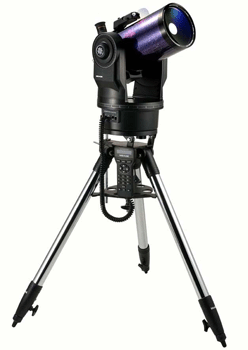
Aligning a Meade ETX Premier Edition

Note: To scroll through a list on the ETX hand controller, use the Up and Down buttons on the bottom of the hand controller rather than the arrow keys in the middle of the controller.
Aligning the Telescope
1. Press 0 to begin automatic alignment
If this is the first time using the telescope, you must enter a location. If you have already done this before, the hand controller will skip ahead to step 4.
2. Press 1 to enter your zip code. (If you are at a remote observing site and do not know the zip code, press 2 to select the nearest city.)
3. Enter your zip code using the keypad
4. Press 1 for Daylight Savings Time, 2 for Standard Time
5. Unlock the left-right clutch lever (on the base of the scope between the fork arms) and rotate the telescope counterclockwise until it stops. Lock the clutch lever.
6. Press ENTER
The telescope will now find north and level. Once finished it will automatically point to an alignment star. This will be the brightest star near where the telescope is pointed.
7. Press 7 to select 1.0°/sec slew speed
8. Center the star in the finderscope
9. Press 5 to select 64x slew speed
10. Center the star in the eyepiece, press ENTER
The telescope will now point to a second alignment star.
11. Press 7 to select 1.0°/sec slew speed
12. Center the star in the finderscope
13. Press 5 to select 64x slew speed
14. Center the star in the eyepiece, press ENTER
The hand controller should now display "Alignment successful." The telescope is now aligned.
Selecting Objects from the Catalog
1. Press ENTER to select OBJECTS
2. Use the Up and Down buttons to select Catalog (Solar System, Messier, etc.), press ENTER
3. Select object from the catalog by using the arrow keys to select from a list or enter a number using the keypad
4. Press ENTER to select object
5. Press GOTO to send telescope to that object
6. Press MODE to return to previous menus

